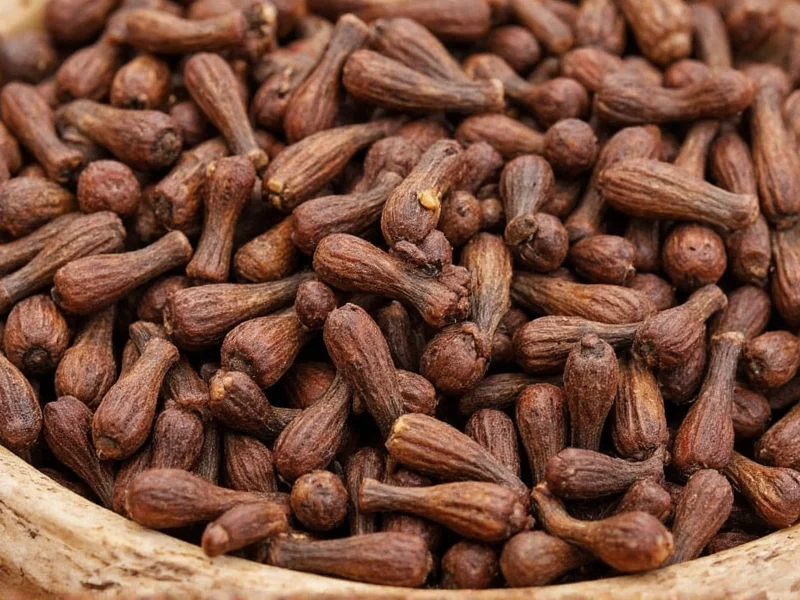Culinary Applications of Whole Cloves
Whole cloves serve as a versatile spice in global cuisines. Unlike ground cloves, which lose potency quickly, whole cloves maintain their intense flavor and aroma for extended periods. Chefs prefer them for dishes requiring long cooking times where sustained flavor release is essential.
When how to use whole cloves in cooking, consider these applications:
| Culinary Application | Recommended Usage | Flavor Pairing |
|---|---|---|
| Meat Braises & Stews | 2-3 cloves per pound of meat | Beef, lamb, onions, bay leaves |
| Rice Dishes | 3-4 cloves per cup of rice | Cardamom, cinnamon, basmati rice |
| Beverages | 4-6 cloves per liter of liquid | Citrus, cinnamon, allspice, black tea |
| Pickling Solutions | 5-8 cloves per quart of brine | Vinegar, mustard seeds, peppercorns |
Medicinal and Therapeutic Benefits
The health benefits of whole cloves stem primarily from eugenol, comprising 70-90% of clove essential oil. Traditional medicine systems worldwide have utilized cloves for centuries, with modern research supporting several applications.
For dental health, cloves remain remarkably effective. The benefits of whole cloves for toothache include temporary pain relief through eugenol's natural anesthetic properties. Place one whole clove directly on the affected area for 15-20 minutes to reduce discomfort—a practice documented since ancient Chinese medicine.
Digestive applications include:
- Relieving nausea and motion sickness
- Reducing bloating and gas
- Stimulating digestive enzyme production
- Alleviating mild stomach cramps
When considering whole cloves vs ground cloves for medicinal use, whole cloves generally contain higher concentrations of active compounds since grinding accelerates oxidation and volatile oil loss.
Aromatic and Household Applications
Beyond cooking and health, whole cloves offer numerous household uses. Their strong, warm scent makes them ideal for natural fragrance solutions. The uses of whole cloves in traditional medicine extend to air purification practices in many cultures.
Create a simple pomander by studding an orange with whole cloves—this natural air freshener releases fragrance as it dries while providing mild antimicrobial benefits. This technique, dating back to medieval Europe, remains effective for freshening closets and drawers.
For natural pest control, cloves repel insects including moths, ants, and mosquitoes. Place whole cloves in sachets near windows or in pantry corners to deter pests without chemicals. The whole cloves for natural pest control method works because insects find eugenol overwhelming to their sensory systems.
Proper Selection and Storage Techniques
Understanding how to store whole cloves properly ensures maximum shelf life and potency. Select cloves with intact, bulbous heads and reddish-brown color—they should feel heavy for their size, indicating high essential oil content.
Store whole cloves in airtight glass containers away from light and heat. Properly stored, they maintain quality for 2-3 years, significantly longer than ground cloves (6-12 months). Check freshness by squeezing a clove; quality cloves will release aromatic oil.
When incorporating cloves into recipes, remember that how to use whole cloves in baking differs from savory applications. In sweet dishes, use fewer cloves as their intense flavor can dominate delicate desserts. Always remove whole cloves before serving, as biting into one creates an unpleasantly concentrated burst of flavor.
Preparation Methods and Safety Considerations
For optimal flavor extraction, toast whole cloves lightly in a dry pan before use. This technique enhances their aromatic compounds without burning. Alternatively, steep whole cloves in warm liquids for beverages like whole cloves for mulled wine recipe preparations.
While generally safe, consume cloves in moderation. Excessive intake may cause mouth irritation or digestive discomfort. People with bleeding disorders should consult physicians before using cloves medicinally, as eugenol has mild anticoagulant properties. Never apply undiluted clove oil directly to skin or gums.











 浙公网安备
33010002000092号
浙公网安备
33010002000092号 浙B2-20120091-4
浙B2-20120091-4